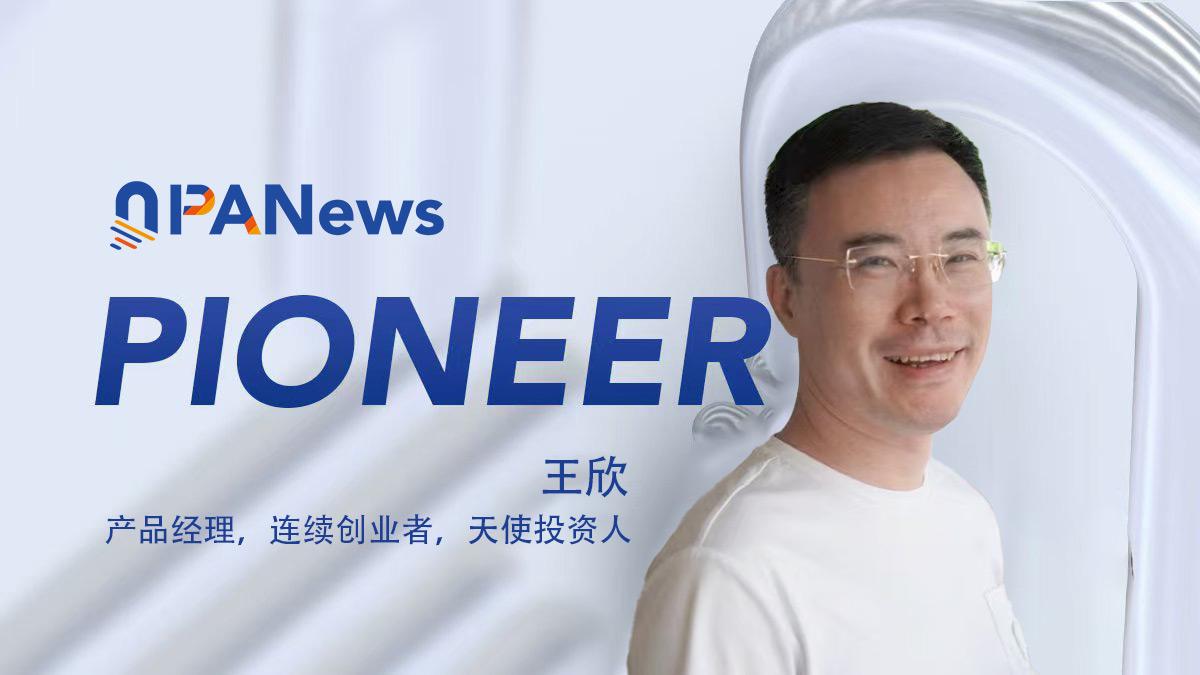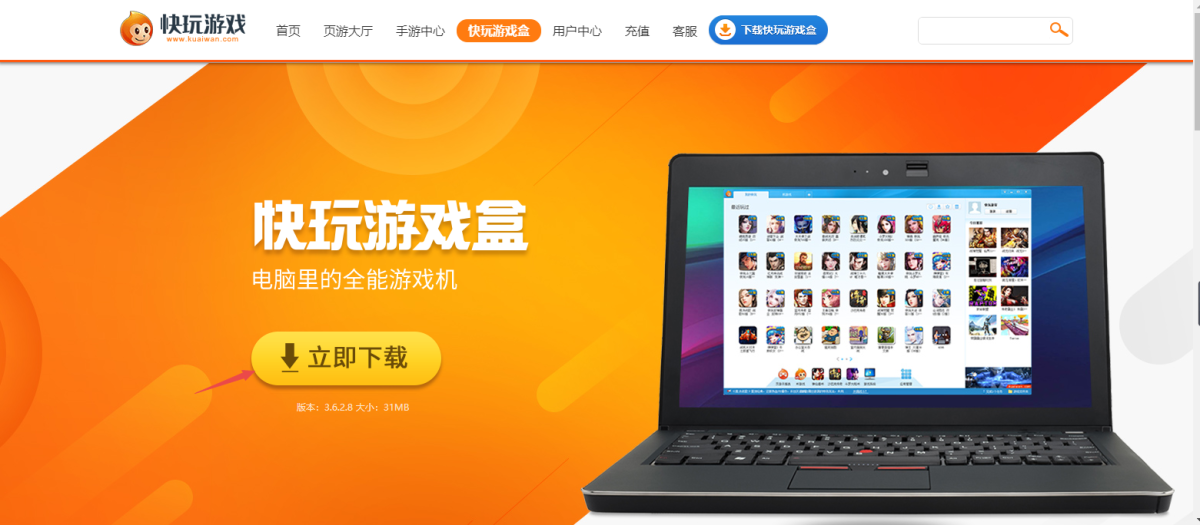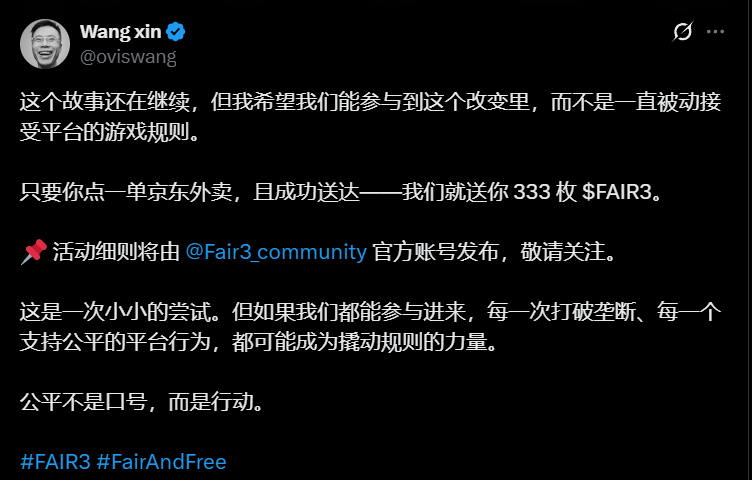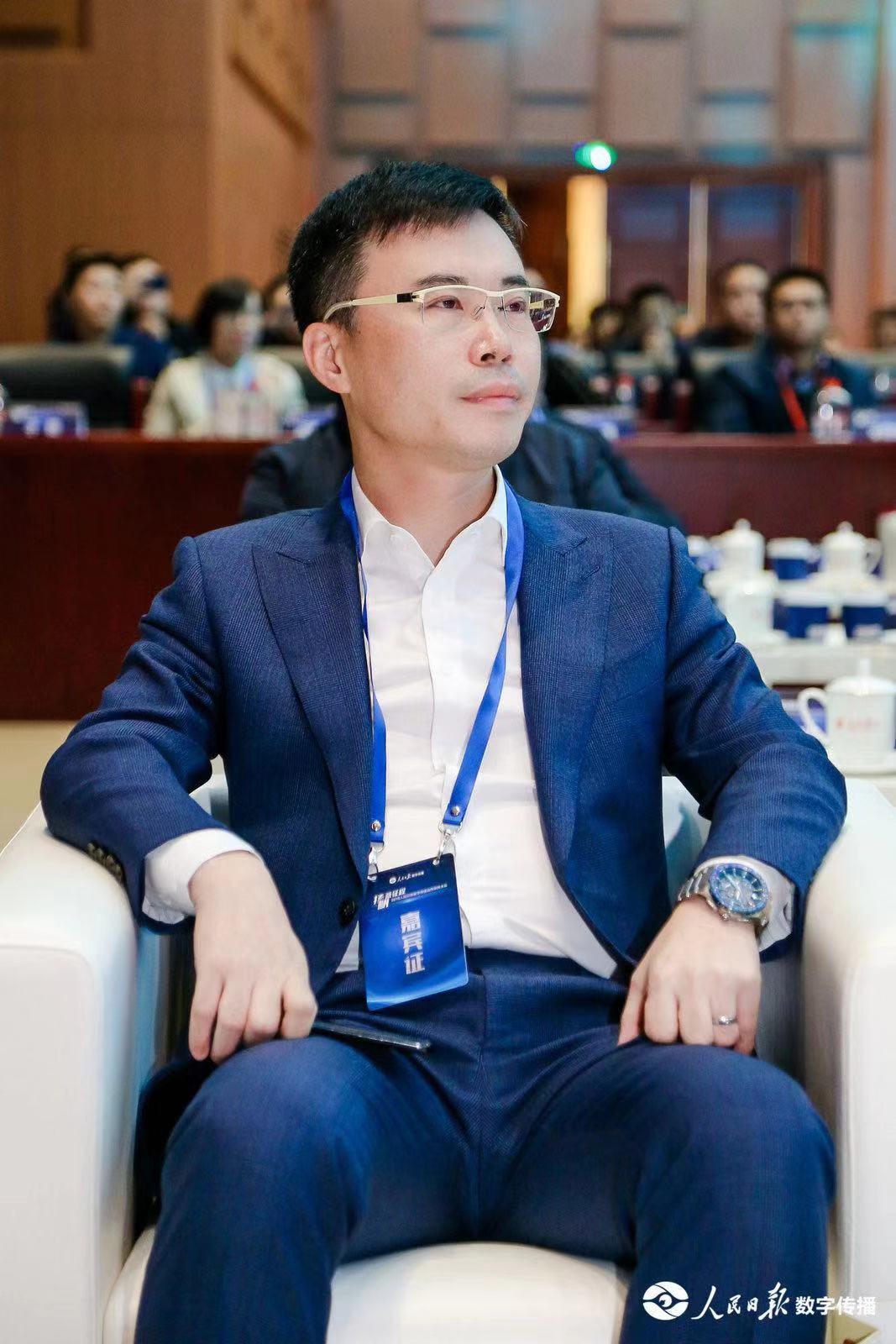Interview with Wang Xin: From Kuaibo’s “technical innocence” to Web3’s “technical fairness”

Reprinted from panewslab
05/09/2025·13D
Author: Zen, PANews
In the golden age of the development of China's Internet, Kuaibo was once a legend in the hearts of countless people. This video player once accounted for 80% of the domestic video traffic and served more than 500 million users. The creator of Kuaibo, Wang Xin, also experienced ups and downs in life from peak to trough.
After regaining freedom, Wang Xin returned to the public eye with a new attitude. However, the "second spring" of entrepreneurship was not smooth. As the popularity of new products dissipated, Wang Xin, who started a second business, gradually "retired" and remained silent for a long time.
Until early 2025, Wang Xin regained his entrepreneurial enthusiasm and announced that he would devote himself to Web3 and focus on the intersection of AI Agent and the crypto economy. He also put forward the concept of "technical equity" and regard it as the core value of the next stage of entrepreneurship.
In an exclusive interview with PANews a few days ago, Wang Xin frankly shared his review of the past, his persistence in fair technology, and his belief in starting anew in the Web3 wave.
Passing the blockchain industry twice without entering
In 2011, Wang Xin first came into contact with Bitcoin. Out of curiosity about decentralized currencies, he read the source code of Bitcoin and simply mined some coins. Because he focused on Kuaibo's business at that time, he did not devote much energy to it and did not spend too much time researching. At that time, BTC was more like a geek's experimental product in his eyes: it fluctuated violently and the prospects were unknown.
"The mentality of looking at Bitcoin now is completely different." More than ten years have passed, Wang Xin’s view on Bitcoin has completely changed. On the one hand, the blockchain technology behind Bitcoin made him sincerely admire its technological innovation; on the other hand, Bitcoin has grown from rarely interested in it, step by step to mainstream assets at the same level as gold. Wang Xin said that with the community-driven, uncentralized organizational endorsement structure, building global trust has subverted his initial suspicion and given him a lot of inspiration.
Compared with the current cooling period of the Web3 industry, 2018 is undoubtedly an era of hot money for most practitioners and investors. Many Internet entrepreneurs have all in after Xu Xiaoping, founder of Zhen Fund, raised his arms and called for "embracing blockchain". In February of that year, Wang Xin was free and "come back" in a small gathering with Xiaopeng Motors founder He Xiaopeng, 58 Group CEO Yao Jinbo, and Huyao Times CEO Li Xueling and others. He Xiaopeng said on social media that Wang Xin is in good health and her thinking is consistent with them. Everyone discussed the development of AI, video and blockchain technology together. At that time, there were many rumors that Wang Xin wanted to enter the blockchain industry.
 He Xiaopeng, the
first on the left, Yao Jinbo, the second on the left
He Xiaopeng, the
first on the left, Yao Jinbo, the second on the left
However, Wang Xin finally chose to establish Yunge Artificial Intelligence in Shenzhen, devoted himself to the social and AI track, and successively launched "toilet" and "Lingge AI". Due to previous experience, Wang Xin said that he could not lead the team to take policy risks. "If you were all in blockchain at that time, you would be afraid that you would touch the red line," Wang Xin admitted.
Around 2018, although the ICO craze has not dissipated, the regulatory policies are highly unclear, and the domestic blockchain entrepreneurship environment has suddenly tightened. As an entrepreneur responsible for the team and the company, Wang Xin once asked the company to fire employees after the incident on Kuaishou to get compensation for applying for labor arbitration. Therefore, when starting a second business, he was responsible and he was unwilling to let the team take any risks. However, within the company, small teams are still retained to continue to pay attention to the blockchain industry and maintain learning and research on this technology.
Shenyin, settled for several years and entered Web3
Since launching the social application "toilet" and the recruitment product "Lingge AI", which focuses on flexible employment, Wang Xin once faded out of the public's vision for three or four years. Regarding this "Shen Yin", Wang Xin said that this was done intentionally and was also due to the environment.
"Lingge AI" and "toilet" did not cause any splashes in the future except that they gained attention due to Wang Xin's halo of "star entrepreneur" at the beginning of the release. Neither product met expectations, and the "toilet" project was even stopped before it was launched. This ups and downs made him realize the need to reflect calmly. Wang Xin said: "I think this kind of adjustment is quite important for a serial entrepreneur like me. I have had glory and troughs. In fact, I need a stronger heart and clearer goals. I think I can go further by sedimenting myself."

In 2019, in an interview with the Beijing News, Wang Xin once said, "I can't be a good investor, I will be a good entrepreneur." However, during the sedimentation period of several years, he actually invested in many projects, mostly focusing on the hardware and AI fields, such as the flying car company "Xiaopeng Huitian", which is being considered for listing recently, and a lidar company that occupies a major share of the global market. Wang Xin said that he did not intend to be an investor, but was invited by friends to help with some guidance and support, and as he gained further understanding, he would participate in investment. He also revealed that he has not participated in investing in Web3 projects at present.
Although he has not officially entered the market, Wang Xin has always had a deep connection with the blockchain industry. Kuaibo's P2P technology allows all users to publish shared files and is not easily controlled by the central system. Its concept is similar to that of blockchain network systems. In addition, Kuaibo has launched a traffic ore project, which aims to gather many idle bandwidth and CPU resources such as personal handheld devices, home bandwidth, and enterprise nodes. It can optimize real-time deployment and utilization through cloud computing. In essence, it is to use the sharing economy model to make CDN (content distribution network). To a certain extent, this is also the prototype of DePIN today.
With the rapid development of the AI industry, the popularity of big models such as ChatGPT, and the Web3 policies in countries and regions such as Singapore and Hong Kong have gradually become clear. Wang Xin realized that these two technologies that significantly increase productivity and improve production relations can be integrated. All these entry points have also become his "entry point" for entering the Web3 industry.
Focus on Web3 + AI agent
Looking at the entire AI industry, "Web3+AI" is currently just a very niche track, and even many celebrities' "Web3+AI" projects have been criticized for being "short-made". In fact, Wang Xin's time and understanding in the field of AI may exceed most of today's Web3 practitioners.
Based on personal entrepreneurial and investment experience, Wang Xin said that if small companies and teams build general AI platforms, the cost pressure will be extremely high. Computing power expenditure often accounts for 80–90% of the budget, which is difficult for entrepreneurs to support. He believes that instead of being a general platform, it is better to focus on vertical scenarios and create "small and beautiful" landed products, or find another way to combine AI with Web3 and find a new business model.
"AI is very centralized, including big models, which are super-centralized. It actually has nothing to do with Web3. At this time, we think, which part of AI will have something to do with individuals? That is the AI agent," said Wang Xin.
The essence of AI Agent is an orchestable automated workflow, requiring people to participate in tuning and decision-making. People's choice of results is actually involved in the "training" of the Agent. Wang Xin said that when a community or KOL repeatedly optimizes the same type of tasks, they have the core value of this Agent. At this time, the ownership and distribution of income of Agent should belong to these contributors themselves. With the help of Web3's public/private key system, each agent can have a unique on-chain identity, and smart contracts record each contribution and corresponding benefits in real time, ensuring that the "data contributor" truly becomes the "value recipient".
In addition, Wang Xin believes that the two core cores of Web3 are asset issuance and asset transfer. The former has a lower threshold, while the latter's infrastructure is becoming more and more perfect. The real problem is how to continuously increase the value of the issued assets, and how to make community participants, operation teams, and ordinary users get their own advantages in the ecosystem. He pointed out that the solution lies in improving product strength and making good use of Web3 to reshape production relations, which contains a lot of potential innovations. For example, solve the pain points of Web3's high learning costs, private key management, and gas fee settings, so as to avoid rejecting most netizens. When the chain experience is close enough to people's daily operations, new careers, new communities, and new entrepreneurial opportunities may emerge.
How does the "hidden" game giant view chain games?
In addition to video players, Kuaibo’s gaming platform "Quaiwan Game Box" was once an important revenue part of the company. This platform that integrates massive games has opened the door to the single-player game world for countless players. Its peak period was even "highlighted" with Steam China, with more than one million monthly active users, which is better than most chain game projects. In the Web3 field, the gaming track, which was once highly anticipated, is in a long-term downturn.

"It is difficult to get both playability and decentralization." When asked whether he is optimistic about the prospects of Web3 games, Wang Xin admitted that truly fun games do not rely on Web3 to exist. In fact, whether it is a masterpiece of the game, or the classic web games and stand-alone players in the past, players are chasing immersion and fun, rather than the way they implement the underlying technology. When developers blindly use blockchain as a "financing tool" and "coin issuance channel" and superimpose it on the game, playability will often be discounted. Players who want to learn private keys, worry about handling fees, and worry about asset security completely deviate from the original intention of "the game should make people happy".
"If a new game carries innovative gameplay and Web3 mode at the same time, the chance of success is extremely low." Wang Xin pointed out that the core of the game is always content. No matter how the technology iterates, players pursue plot, graphics, manipulation and social experience. The correct path should be to start from "a certain link". For example, using low-cost payments on the chain to replace traditional credit cards and App Store share sharing, saving 3-10% of the handling fee, reducing the pressure on game manufacturers to acquire customers and cash out. In addition, during the cross-border issuance process, players recharge, share profits and withdrawals are completed with stablecoins or multi-chain wallets, and developers can reduce costs without expensive advertising.
When the payment and profit sharing links are smoothly integrated into the game, players not only enjoy the traditional gaming experience, but also use the Web3 infrastructure without realizing it. Developers will also reduce the profit distribution of intermediaries and have the ability to continue to provide better products after obtaining more profits. "So how to make them profitable, I think this needs to be changed through these production relations of Web3."
Why support Meme currency Fair3?
After coming to the Web3 industry, Wang Xin's identity seems to be no longer a serial entrepreneur, but a supporter and preacher. He often shares his views on artificial intelligence and blockchain technology on social media, and sometimes directly mentions the Fair3 he is supporting. According to Wang Xin, it is not a "project" in the traditional sense, but an ecosystem with "technical fairness" as its core concept.
Wang Xin said that Fair3 originated from a pure Meme coin. After a group of core members (CTO team) took over, they began to think about a more profound vision: not only the cultural attributes of the community, but also to build a truly decentralized ecosystem so that every individual can benefit from participation. Fair3 hopes to use the power of Web3 to challenge the various unfairs caused by centralized algorithms and platform monopoly in the traditional Internet, and transform the culture of "sand piles into towers" into real ecological value.
"Every change in production relations in history solved the core problems at that time, agriculture solved food, and industry solved capital," Wang Xin further stated, and in today's "knowledge stage" and "attention stage", the monopoly of data and algorithms has made ordinary users and content creators exploited. Mainstream platforms take high commissions for creators, cost of buying e-commerce as much as 30-40%, and even pump content distribution to 90%. These are unfair behaviors. What Fair3 needs to do is to gather the "sand" of countless tiny individuals, make unfair manifested through the cohesion and voice of the community, and use decentralized technology to achieve the transformation from cultural construction to ecological implementation.
For example, the CTO team has organized several small-scale Meme cultural creation and sharing activities, and community members independently record "unfair stories", record personal encounters and support each other. Recently, the community also launched the "Take-out fairness" campaign, encouraging community members to support JD Take-out, and airdrop tokens for participants, revealing and correcting the unfairness of platform subsidies and commissions through actual consumption behaviors.

Wang Xin revealed that the current overseas community of Fair has reached 20,000 to 30,000. With the advancement of ecological construction, Fair3 plans to introduce more open source projects and tools, including investment analysis, airdrop information push, consumer matching platform, etc., to provide tangible value to coin holders and consumers.
What is technical fairness?
During the interview, Wang Xin mentioned "technical fairness" several times. He also shared with us the detailed connotation of this concept: to truly achieve technological fairness, it is necessary to meet the three elements of algorithm transparency, data belonging to individuals and individual continuous profit.
Algorithm transparency means that all core algorithms must be open source and auditable, and there cannot be any "black box" operations. Only when participants can clearly see the algorithm logic can they maintain trust in the results; once the algorithm is opaque, it will cause widespread doubts and conflicts. Wang Xin said: "All our projects will adhere to open source algorithms to ensure all users have equal rights to inform system rules."
In big model training and various digital services, massive amounts of personal data are often harvested by the platform for free and used for commercial monetization, but original creators and ordinary users find it difficult to obtain any profit or confirm rights. Technical fairness requirements: Each piece of data should have ownership and use rights by its producer, and a clear proof of right confirmation can be obtained on the chain. Only in this way can individuals truly become "masters" in the digital economy and avoid the situation where value is contributed free of charge but are deprived of profits.
Wang Xin believes that individuals should not only be able to participate in technology construction and data provision, but also continue to obtain economic returns through their own contributions and consumption behaviors. He took his friend Li Xueling as an example - after Li finished a weight loss injection, he shared his experiences and feelings to the community and acquired the stock of the biotech company; when more people benefited from their recommendations and further increased their positions, both the original recommender and the audience received a dual return of "consumption + investment".
He also pointed out that although traditional takeaway guys work hard, they lack a sustainable profit mechanism and will have no income and protection once they stop working; and in the decentralized token economy, early builders and active consumers can continue to share the platform's growth dividends due to coin holding and promotion.
Quick broadcast can only represent the past
After Wang Xin was imprisoned, "I owe Kuaibo and Mr. Wang a member" became a hot topic in China's Internet. To a certain extent, behind this joke is also support, thanks and emotional recognition for him. Based on such a mass base, Wang Xin seems to have the conditions to issue personal tokens and "replenish" membership fees.
"This is a meme" Wang Xin responded with a smile. When Kuaibo was forced to terminate in the early years, it was these users' "sand-cracked sand into towers" that helped him overcome difficulties, so he was deeply grateful for this friendship. But he made it clear that tokenizing this emotional tokenization poses a risk of "overdrawing fans" to him, which is not in line with his pursuit of technological fairness, and may also capitalize the emotions of his supporters, so he "will definitely not issue personal tokens."

In addition, he also believes that Kuaibo can only represent the past, and high-quality memes (such as cats and dogs) are cultural symbols that can transcend time and space and represent the future. Kuaibo's "pastness" means that it is not a good meme, and therefore it is not suitable for tokenization.
And the outside world questioned his personal image to build momentum and cut leeks for Fair3. Wang Xin frankly admitted that he had also "retreat" and was worried about causing trouble. But the community's support made him firm. Many people believe that he was not here to "cut leeks", and making quick money is not the purpose.
He revealed that Binance co-founder He Yi had a private message to communicate with him and warned: "issuing coins is like issuing bonds." That is, once a certain token is issued or supported, you have to bear the responsibility and debt to the community. He regards himself as a debt of "technical fairness", and must continue to speak out for the community and build an ecosystem, rather than make a one-time profit. The price of currency is inevitable, and freedom of speech also allows doubts, but the key is to insist on doing a good job in products and communities, and to truly benefit holders through continuous feedback, thereby achieving sustainable ecological development.
Wang Xin further stated that he and his team, as well as his funds, are working hard to improve their products and business models, hoping that early participants can continue to receive returns. He compared the platform to a live broadcast ecosystem, hoping that everyone has the potential to create value.
He also shared his experience of preaching Web3 to his family. "I am also working on a web3 construction for the family." Wang Xin said that he has allowed his wife and children to come into contact with Web3, such as owning a wallet and speculating on meme coins, and even made some money in "PVP". He encourages senior daughters in high school to think about the needs of peers, such as game play, blind box exchange, etc., which may all be able to form a small-scale social economy through simple tools and token design.
"I think the future opportunities are all on AI and Web3. If she starts contacting us from now on, it will be a particularly good thing." Wang Xin added.



 chaincatcher
chaincatcher